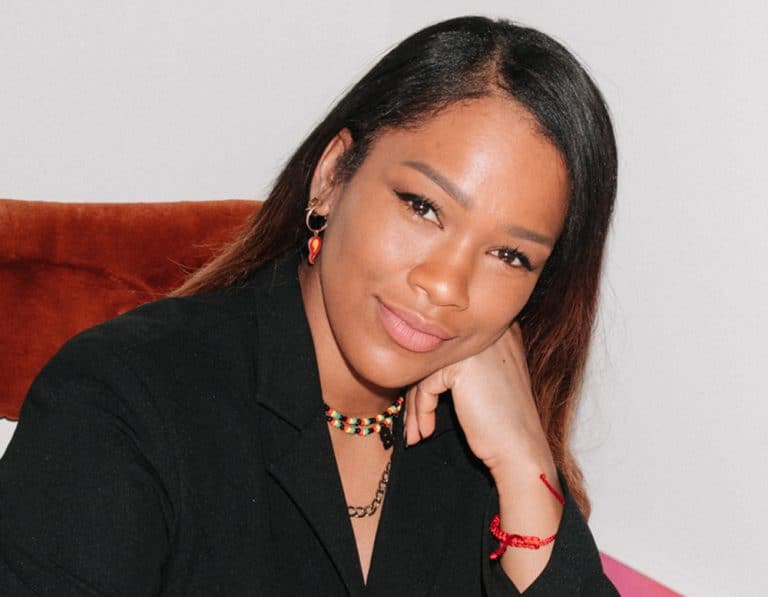Health On Your Terms: Sharmadean Reid, founder of Beautystack talks female health
You don’t need to be a beauty buff or tech nerd to know who Sharmadean Reid is. The founder and CEO of Beautystack has made a name for herself not only in her respective industries but also as a mentor and advocate for female empowerment.
For the first instalment of Health On Your Terms, we spoke to Reid about her relationship with western medicine, listening to your body’s needs, and how her demanding life as a CEO and mom led her to have a more intuitive approach to health.
You have mentioned how your heritage has influenced the way you approach health, and that western medicine isn’t really for you. Has that always been the case?
Yes, when I was a child my Jamaican grandparents would use various natural remedies whenever I was ill. Even today my grandma will have a pot on the stove with comfrey leaves (vitamin B12), lemons and garlic.
Do you find yourself turning more to complementary medicine?
Yes, I seek experts in their field. I don’t believe in a one size fits all situation. I love seeing someone who is passionate and up-to-date in the latest developments in their arena whether it’s acupuncture, massage or nutrition.
It’s become a lot more popular in the past couple of years, but a lot of people dismiss it as pseudoscience. What are your thoughts on the rise of complementary medicine?
I think it’s funny that we call it ‘complementary medicine’ when it was the original medicine, and modern medicine as we know it is a few hundred years old, whereas medicine as traditional people know it is several thousand years old. So I wouldn’t call it a ‘rise’, it’s a return.
You had a home birth. What was your decision process and what made you want to have a home birth as opposed to a hospital birth?
I’m just not familiar or comfortable with hospitals. I see them as a place for where the sick go to be healed and I didn’ t see pregnancy as a sickness. I wanted to have a quiet space to meditate and concentrate on my breathing. I didn’t want to be distracted by strangers, I wanted my son to enter the world in his future home, surrounded by love, not fear.
Has being a mother changed your relationship with health?
Definitely. I’ve become wholly more conscious of what I put into my body and into his. His little brain is growing so fast, I was thinking, “how I could help nourish that human growth, not take away from it?” I’m also more conscious of everything that was processed, manufactured, packaged up for a quick mom sell.
Growing up very few of us have a clear understanding of reproductive and sexual health, what was yours like?
I’m Jamaican. We know about sex.
Are you on any method of contraception?
None. I tried taking the pill at 16 and felt sick. I had an implant for 6 weeks and took it out as it made me feel so ill.
Naturally, given what you do you’re very clued into beauty and wellness, but do you have any health routines focused around your reproductive or menstrual health?
I have low iron levels, like many black women, so around my period I try to up my iron intake while not overloading my digestive system with red meat. I try to exercise to keep my energy up but essentially I just listen to what my body is telling me it needs and indulge it regardless.
Have you always had this intuitive approach?
I developed it over time as a preservation mechanism. It’s really easy to burn out and when you burn out it’s because you’re not listening to the responses in your body. I used to have really bad chest pains that I didn’t know for a long time were anxiety attacks, and then the minute I understood what my body was going through I decided to listen out for the twinge of that attack and control it and respond to it.
I imagine that running a company and being a mom means your days are really busy. How do you make time to stay on top of your health?
I just try and live moderately. I eat what I want, I exercise at least once a week although my ideal would be three times. I’m in bed by midnight and I don’t drink that often. I need to maintain my energy to achieve everything I need to do in a day!
You’re very passionate about tech, and how tech can help empower women. Is there any way you incorporate tech into your health routines?
I don’t use any fertility apps, I just use the period tracker in Apple Health just to know when my period is coming. I use the Moody Month app for regular insights into my cycle and how it affects my hormones. If I’m in a mood, it’s nice to know it’s because my period is coming! Usually, my mood is changed and I’m looking for reasons why, so my period could be one thing but it could also be my diet, lack of sleep, lack of exercise. I use Daylio as a journaling app.
Daye is a new brand for female health products designed with women in mind. The company’s first product is a CBD tampon that helps tackle period cramps as an alternative to traditional painkillers. Daye products are a well-needed wake-up call to the stagnant tampon industry. Read Vitals, Daye’s female health educational content platform, for all things health, culture and innovation from Daye.





